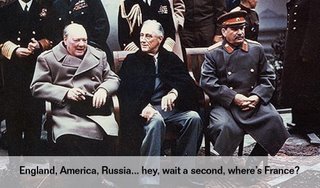Unserious about... well, everything
A failed state in the middle of the desert, that's what!
After the fall of Saddam Hussein's government in April 2003, the opportunity to participate in the U.S.-led effort to reconstruct Iraq attracted all manner of Americans — restless professionals, Arabic-speaking academics, development specialists and war-zone adventurers. But before they could go to Baghdad, they had to get past Jim O'Beirne's office in the Pentagon.Of course, Republicans are the only ones we can trust to be serious about protecting the country from terrorism. And remember, Iraq is supposed to be the central front in the War On Terror, a struggle so epic that it threatens the very future of Western Society.
To pass muster with O'Beirne, a political appointee who screens prospective political appointees for Defense Department posts, applicants didn't need to be experts in the Middle East or in post-conflict reconstruction. What seemed most important was loyalty to the Bush administration.
O'Beirne's staff posed blunt questions to some candidates about domestic politics: Did you vote for George W. Bush in 2000? Do you support the way the president is fighting the war on terror? Two people who sought jobs with the U.S. occupation authority said they were even asked their views on Roe v. Wade .
Many of those chosen by O'Beirne's office to work for the Coalition Provisional Authority, which ran Iraq's government from April 2003 to June 2004, lacked vital skills and experience. A 24-year-old who had never worked in finance — but had applied for a White House job — was sent to reopen Baghdad's stock exchange. The daughter of a prominent neoconservative commentator and a recent graduate from an evangelical university for home-schooled children were tapped to manage Iraq's $13 billion budget, even though they didn't have a background in accounting.
The decision to send the loyal and the willing instead of the best and the brightest is now regarded by many people involved in the 3 1/2 -year effort to stabilize and rebuild Iraq as one of the Bush administration's gravest errors. Many of those selected because of their political fidelity spent their time trying to impose a conservative agenda on the postwar occupation that sidetracked more important reconstruction efforts and squandered goodwill among the Iraqi people, according to many people who participated in the reconstruction effort.
The CPA had the power to enact laws, print currency, collect taxes, deploy police and spend Iraq's oil revenue. It had more than 1,500 employees in Baghdad at its height, working under America's viceroy in Iraq, L. Paul Bremer, but never released a public roster of its entire staff.
Interviews with scores of former CPA personnel over the past two years depict an organization that was dominated — and ultimately hobbled — by administration ideologues.
"We didn't tap — and it should have started from the White House on down — just didn't tap the right people to do this job," said Frederick Smith, who served as the deputy director of the CPA's Washington office. "It was a tough, tough job. Instead we got people who went out there because of their political leanings."
Way to protect the nation, guys.



